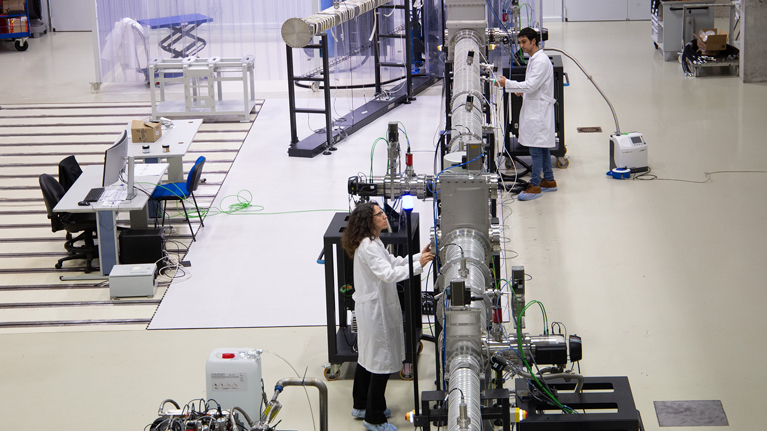In 2024, Tekniker reinforced its position as a technological partner supporting companies thanks to another record-breaking turnover of 33.5 M €
The technology centre’s historical income registers show that industrial contracts unrelated to publicly-funded programmes grew 40% last year.

Most of the efforts made by Tekniker, a member of the Basque Research and Technology Alliance (BRTA), in terms of its Strategic Plan were focused on boosting technology transfers. In this regard, the results reported in 2024, yet another landmark year for Tekniker, show a figure of 33.5 million Euros that have served to underpin the organisation’s mission.
Fifty percent of the income produced by industrial projects involving companies that engaged the organisation’s services to receive technological support focused on three main areas, namely, technologies related to advanced manufacturing, surfaces, materials and digitisation. Moreover, direct contracts associated with initiatives of this kind and not supported by public funding grew 40% with a total of 160 projects currently in progress. This figure shows the relevance of Tekniker’s contribution in terms of the business fabric as, thanks to this collaboration, all the firms involved have obtained substantial direct returns.
The value of what Tekniker has delivered to more than 250 of its customers operating in highly demanding sectors such as aeronautics, energy or health has been supported by 29 long-term collaborative agreements. This network comprising leading collaborative firms from these sectors show how much mutual trust and commitment prevails nowadays in terms of innovation and technological excellence.
It must also be underscored that the 47,8 million in turnover reported by Tekniker in 2024 is the end result of adding up the portfolio revenue of the technology centre’s six investee companies out of a total of 32 start-ups that were born thanks to the support provided by the technology centre since its inception.
Luis Uriarte, Tekniker’s director general, underscores that “the data reported reflect a solid strategy that is constantly adapting to how the environment evolves and to ever-changing market requirements. Our goal is to continue focusing on specialisation, technology transfers and to set up Deep-Tech start-ups. In order to do so, however, the Erisono technology park must play a key role and we are currently doing our utmost to attract high added value firms”.
In 2024, Tekniker launched a number of collaborative laboratory initiatives in concert with industrial firms to offer a joint workspace to design, develop and validate integral, scalable solutions covering different technologies. The aim of this initiative is to assist companies in their transformation processes by providing a strategic instrument to properly address technology, industrial needs and sustainability.
Tekniker’s approach towards technological innovation was recognised by the award to the Best Initiative Submitted by Technology Centres at the 2024 Disruptor Innovation Awards. The award distinguished the ESA-funded HORACE project, in which Tekniker developed a wind turbine adapted to conditions on Mars, a disruptive solution that has opened up new pathways with regard to generating power for future space exploration missions.
Specialisation and scientific excellence
With a workforce of more than 300 people at the end of 2024, one of Tekniker’s priorities associated with its Strategic Plan has consisted in extending and achieving a higher degree of specialisation in preferential lines of action focused on technologies that will help boost the future of the industry by constantly incorporating the sustainability variable into what the organisation offers within the scope of a human-centred approach.
Uriarte also underscores “how the technology centre has specifically focused on quantum technologies in terms of computation and algorithmics and on producing quantum sensors. The development of quantum AI could solve problems that, until now, were computationally unapproachable on conventional computers due to their complexity”.
Tekniker’s specialisation is supported by a track record of more than 40 years of proven scientific excellence in applying R&D&I to projects funded by the EU, Spain and its regions featuring, in the last ten years, an average yearly reported fund-raising figure of 5.9 million Euros. In 2024, turnover associated with European projects accounted for 17% of the total figure reported, whilst contributions associated with programmes sponsored by the Basque Government climbed to 27%.
Tekniker’s outstanding research and innovative capabilities are also supported by a high number of doctors (78), patent families (118) and patents (357).
Innovative examples
Tekniker is currently involved in several innovative projects that could potentially be applied to several strategic sectors. One of the most outstanding projects is called ECOAERO addressing the aerospace sector and designed to incorporate technologies such as additive manufacturing, applied AI and robotics in the area of smart manufacturing to position the aerospace ecosystem at the cutting edge of technology.
As regards the manufacturing sector, FIDELIA is a strategic initiative focused on furthering innovation in the area of advanced manufacturing by incorporating technologies such as AI and deep learning. The project will generate an ecosystem to disseminate advanced technologies and carry out R&D&I projects associated with robotics and AI.
Among the various initiatives carried out by Tekniker, special mention must be made of a number of projects that demonstrate its level of commitment to technological innovation and applied research. The DIGIFORM project addresses the challenges posed by industrial digitisation by developing enabling technologies such as simulation and digital twins to enhance automation capabilities for the production of metallic components, especially in the aeronautical sector.
Finally, project LINAC addresses the creation of a small-scale particle accelerator for oncological research purposes to study new therapies and produce isotopes for the detection of anomalies.
